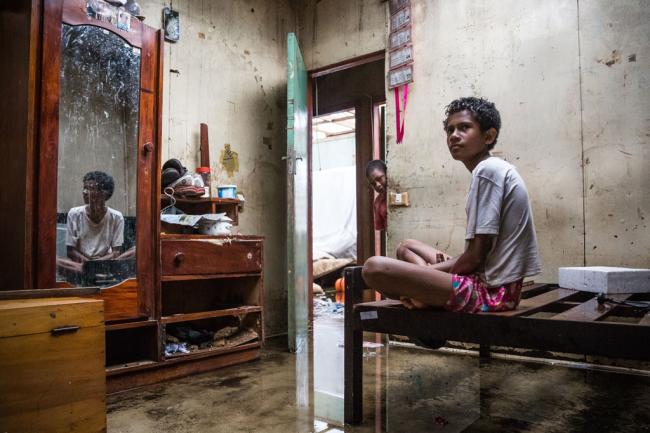
Fiji: UNICEF steps up response as 'full picture' of Cyclone Winston's impact becomes clearer
UNICEF officials say that the trauma of the event itself must not be underestimated, and many children have been affected by varying degrees of loss, including the devastation of losing family or community members, the sadness of losing homes or belongings, and the danger of losing places of critical importance to their development, such as schools and health centres. In addition, there are many dangers at play in a post-emergency situation, such as increasing levels of stagnant water that are a breeding ground for diseases like diarrhoea.
“Children are often the most vulnerable during emergencies and UNICEF continues to support the Government of Fiji's efforts in addressing the needs of children,” said UNICEF Pacific Representative Karen Allen.
UNICEF Pacific's Joseph Hing, who travelled with the first shipment of emergency supplies to Koro Island, one of the areas worst affected by Tropical Cyclone Winston, said that “the damage to Koro Island is extensive and the scale of the destruction is overwhelming,” he said. “I spoke to countless people who have lost everything. Their lives have been turned utterly upside down.”
A grandmother, whose young grandson was nearly swept away by the storm surge, told him that “you can lose all your material belongings, but what's more important is our lives,” he said.
The geographic make-up of Fiji and the logistical challenges involved in completing assessments of the outer islands pose many barriers, but each day brings more progress, the officials said.
The UN agency is continuing to work in close partnership with Fiji's Government and other partners to ensure a coordinated and strategic emergency response.
Within the first 24 hours of the request of the Government for assistance, UNICEF provided 3,000 people in the worst affected areas with water, sanitation and hygiene supplies to ensure safe drinking water and delivered education supplies to 995 students of eight schools in the Lau and Lomaiviti groups.
Emergency health kits, to service a population of 1,000 people for 3 months, as well as tents and education supplies, funded by the New Zealand Government, are being distributed to worst-affected outer islands. On Wednesday night, health supplies which included vitamin A capsules, oral rehydration salts, zinc tablets and six basic health kits were loaded onto boats departing for Gau Island and Batiki Island.
The Australian Government has donated to UNICEF hygiene kits for 7,920 people and water purification tabs for 1,066 household.
However, funding is needed to sustain and scale up this response, the officials say.
“More heartening though are the stories we are hearing of heroism and the very best of humanity,” Ms Allen said, noting that “Fijians are renowned for the kindness and generosity and we are seeing nothing but solidarity and shared commitment to recover together.”
Photo: UNICEF/UN011243/Sokhin
Support Our Journalism
We cannot do without you.. your contribution supports unbiased journalism
IBNS is not driven by any ism- not wokeism, not racism, not skewed secularism, not hyper right-wing or left liberal ideals, nor by any hardline religious beliefs or hyper nationalism. We want to serve you good old objective news, as they are. We do not judge or preach. We let people decide for themselves. We only try to present factual and well-sourced news.







